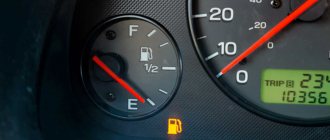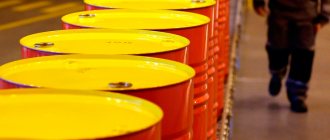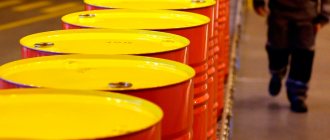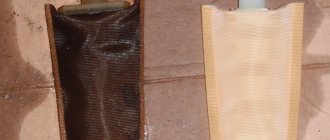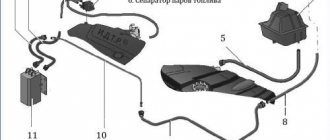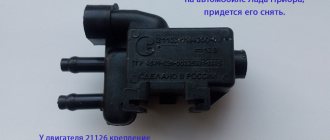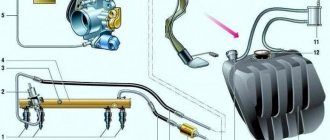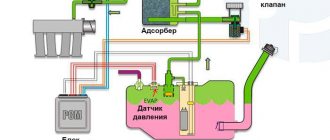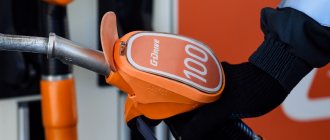Gasoline consumption multiplied by its cost can be the decisive argument in choosing a car, but it is often not enough to know how much fuel is burned according to regulations and in reality. When the indicator gives a signal that there is little fuel, and especially if it fails and the light does not light up at all, the most important question arises: how to find out how much gasoline is left?
Folk tricks
A stationary device that could measure the amount of fuel in the tank with an accuracy of up to a liter is not included in any of the most complete configurations of modern cars. But among car enthusiasts and specialists, on automotive forums, you can find a lot of advice on determining these residues: from rocking the car to evaluate the sound (the less gasoline, the louder the splashes) to weighing it and comparing it with the weight in the owner’s manual. One of these original algorithms for measuring fuel residues is to drain it from the tank into a measuring container, and then pour it back into the tank.
Of course, there are more reasonable methods that are suitable in road conditions.
Design and principle of operation
Most often, control of the surface is carried out using a float. It can connect to the converter in different ways.
Float
The simplest thing is to connect the float to the measuring potentiometer using a lever. Moving the position of the current collector causes the resistance of the variable resistor to change.
It can be in the simplest wire design or in the form of a set of resistors with taps and contact pads along which a slider moves, connected to the float through a lever.
Such devices are the cheapest, but also the most inaccurate. When connecting a computer, they have to be calibrated using test fills with known volumes of fuel.
Magnetic
You can get rid of the lever by connecting the potentiometer to the float using a magnet. A permanent magnet connected to the float moves along the system of contact pads with taps from film resistors of a calibrated value. Above the platforms there are steel flexible plates.
Depending on the position of the magnet, one of them is attracted to it, closing on the corresponding pad. The total resistance of a set of resistors changes according to a known law.
Electronic
The presence of electronic components in the sensor allows a wide variety of devices to be classified in this category. For example, a capacitive sensor, where two capacitor plates are located vertically in a tank.
By instruments
If the fuel indicator is working, the first solution is to navigate it. For example: the volume of the tank is 50 liters, 10 divisions are conventionally marked on the scale, which means that each “beats” 5 liters. When estimating the remaining fuel in this way, remember that the result will be approximate, and pay attention to the location of the car: the car must be strictly horizontal, otherwise the indicator will not correspond to reality.
More accurate readings can be obtained using a special probe. The gas tanks of some old cars were supplied with it from the factory, but by analogy you can do it yourself, having studied the topic well. The distance between the cutoffs depends on the size and shape of the tank; the length of the ruler must be at least one and a half meters, and the material from which it is made must not contain metal and not create sparks.
How many liters of gasoline are consumed per 1 km?
When driving in different cycles, this volume of fuel was enough for us to travel approximately 715 kilometers. We count: 60/715 = 0.084; 0.084*100 = 8.4 liters per hundred km.
Interesting materials:
What does it take to demolish an old house? What does it take to fire a CEO? What does it take to marry a foreigner? What does it take to get married to a prisoner? What is needed to register a child at the place of residence? What should you eat after exercise? What should you exclude from your diet? What should you eat to gain weight? What should you eat to avoid diabetes? What should girls eat when drying their bodies?
Using diagnostic mode
If your car has a dashboard from the Renault family, which selectively includes LADA, Nissan and some others, you can find out how much gasoline is in the tank, accurate to the nearest liter, in the panel diagnostic mode.
To run diagnostics on the device, you need to:
– before turning on the ignition, hold down the daily mileage reset button for 5 seconds, then turn on the ignition and release the button when the instrument needles begin to move;
– use the same button to switch the diagnostic mode of the instrument panel, finding the gas pump icon in the upper right corner.
Below this icon a number is displayed that exactly corresponds to the volume of fuel remaining in the gas tank.
You can check whether the diagnostic mode of the instrument panel will work on a specific car experimentally.
Why you can't drive with a small amount of gasoline
In addition to the stress that comes with driving on low gas, it damages the vehicle because the mechanics of the fuel tank are designed to perform optimally when it is full.
The more air inside, meaning less gasoline, increases the likelihood that impurities in the tank will be transferred to the combustion process, which affects the vehicle's performance.
Likewise, gasoline is a highly volatile liquid, so when the tank is empty, the fuel evaporates faster than when it is full.
There is a very high chance of damaging the fuel pump because it requires a lot of effort to absorb the small amount of gasoline that remains in the tank.
Too little fuel can create air bubbles, which also compromises the integrity of the pump. In addition, the lower the level drops, the more likely it is that the pump will suck up contaminants lying at the bottom.
With sensor
If the dashboard does not support the test mode capabilities described above, the problem of monitoring the amount of gasoline in the car’s tank can be solved using a special wireless sensor installed directly in the gas tank.
A modern device runs on a battery with increased autonomy (up to five to seven years!) and is capable of storing data on changes in fuel level for an average of two months in the built-in memory. The fuel level can be read remotely at any time using a special device that recognizes a radio signal.
How to determine the real fuel level with a faulty sensor
The fuel level sensor is a small but very useful thing. With its help, it is easy for a motorist to understand whether there is a need to stop at the nearest gas station, how much gasoline is left in the fuel tank and how far it will approximately last. If the device fails, the driver can easily be left without fuel at the most inopportune moment. For example, in the dead of night on a country road outside the city. Are there any ways to find out the gasoline level if the sensor is broken?
When the fuel level sensor on the instrument panel begins to work incorrectly, driving a car becomes very inconvenient. For example, after starting the engine, the gauge needle remains at zero, while the tank is still full of fuel. Or, on the contrary, the indicator arrow rises all the way towards a full tank, although you stopped at the gas station a week ago. In other words, the sensor is simply lying. Moreover, it can do this both up and down. The instrument needle can also “jump”, changing readings over a short period of time. In addition, some drivers are faced with the fact that their yellow minimum fuel indicator does not light up.
Without a working fuel level sensor, a motorist will have a hard time, especially during long trips. You will need to constantly keep in mind the moment of your last visit to the gas station. Quite a serious inconvenience due to such a small, but, as it turned out, very important device.
By the way, it’s not just about discomfort, but also about safety while driving. Indeed, according to the current edition of the Road Traffic Rules, operating a car with a faulty fuel indicator on the dashboard is strictly prohibited. So the problem will have to be fixed as quickly as possible.
In order not to end up in the wilderness without a drop of fuel in the fuel tank, the motorist has to keep a canister of gasoline or diesel fuel in reserve in the trunk at all times. However, this method is not very convenient, if only because the fuel container will take up extra space.
The second option: control the fuel level in the tank yourself. On old domestic cars this will not be difficult to do. For example, my grandfather, who drove a “kopek” car, always had a clean glazing bead in his car (this is a kind of wooden strip). When the fuel level sensor broke down (and this happened with enviable regularity) and it was necessary to find out how much gasoline was left in stock, grandfather would open the gas tank, stick this stick into the neck, and then take it out and see how wet the rail was. By the way, my neighbor at the dacha still uses this method in his Zhiguli car. However, this method is not suitable for modern cars.
If you are not the owner of an ancient Zhiguli car, you will have to remember mathematics and use your brain. First, look at the average fuel consumption per 100 km on the on-board computer. Fill up your car. Reset the odometer - this will make it easier to count how many kilometers you have already covered. Now you can calculate the amount of fuel consumed using a certain formula:
Average fuel consumption per 100 km in liters * Number of kilometers you have driven divided by 100 = Number of liters you have used
The resulting number must be subtracted from the number of liters in a full tank. Then you will know the approximate level of fuel remaining in the car.
For example, a car can hold a maximum of 50 liters of fuel. Average gasoline consumption is 8 liters per hundred. You have traveled 260 km. Multiply 8 by 2.60 and get 20.8 liters. It turns out: 50-20.8 = 29.2 liters left in the tank.
If you have already used 70% of the fuel (in this example, this is 35 liters), then it is better not to risk it and fill the tank full again. After all, the calculations are approximate: the average consumption is therefore average because the numbers can vary greatly.
Knowing the capacity of the gas tank, the motorist can easily control the remaining amount of fuel even if the fuel level sensor is faulty. However, when going on a long trip, especially to places where gas stations are not very common, it would still be a good idea to throw a full can of gasoline in reserve. Just in case.
If you don’t want to calculate the remaining fuel every time, you can stop by any car service center, where specialists will measure the actual level of gasoline or diesel in the tank using a special electronic device. Just a joke, of course. Once you have reached the auto repair shop, it is wiser to simply fix the problem. Moreover, repairing the fuel level sensor is not particularly difficult. Many people do this on their own, without the help of specialists.
By the way, most often the fuel indicator malfunctions due to faulty wiring. If the sensor is operational, but shows incorrect information, then this is probably due to the float. In any case, the “final diagnosis” will be determined by the auto technician.
We wish you not to encounter any minor breakdowns like this, much less major ones! Have a nice trip!
How much diesel should be in the tank?
There must be at least half a tank of fuel. And in winter, you need to try to keep the tank always full. This will extend the operating life of the engine.
Interesting materials:
Is it possible to apply liquid wallpaper to wooden walls? Is it possible to apply liquid wallpaper to USB? Is it possible to write another position in the work book? Is it possible to build muscle at home? Is it possible to disagree with the order? Is it possible not to cook boletus mushrooms? Is it possible not to put water in the iron? Is it possible to pour water into a plastic bottle several times? Is it possible to wear a cross and an icon around your neck? Is it possible to treat strawberries with boric acid?
Method No. 3. "Bulb"
This method is perfect for those for whom a full tank is a definite blow to the budget. In terms of accuracy, it is about the same as the two described above. In addition, to conduct this experiment you do not need to allocate separate time and money - it can be performed during your regular business and travel.
Algorithm:
- As soon as the indicator light with the image of a gas station lights up, we immediately reset the daily mileage.
- We go to the nearest gas station and refuel, as usual - as much money as we have for this matter.
- We record the filled liters (V).
- We go about our business as usual.
- As soon as the control lamp lights up again, we record the readings of the daily odometer (S).
- All the data for applying the formula is there.
It is worth noting that the accuracy of this method is higher, the closer the gas station is when your warning lamp lights up.
Method number 4. "Old School Accounting"
Now let's talk about methods for calculating fuel consumption that can boast the highest accuracy. They have two disadvantages. Firstly, to find out as accurately as possible the fuel consumption of your car, it will take more than one day. Secondly, you will need a notebook, a pen, and the ability to remember to write down the current odometer readings and the amount of fuel filled at each gas station.
However, there is also a significant advantage - the highest accuracy of the result obtained.
Algorithm:
- It is best to start taking notes when the warning light on the panel lights up, or when the tank is full.
- At each subsequent refueling, we record the mileage and liters filled.
- We drive like this for a very long time - the longer, the more accurate the result will be.
- When you get tired of recording, we count the total mileage and liters spent during the time when the records were kept.
- We substitute the obtained figures into the same formula, and we get a very accurate average fuel consumption.
It is advisable to make calculations when the condition of the gas tank is the same as it was in the first point, when the accounting began.
Formula for calculating fuel consumption per 100 km
Whichever of the methods described below you use, the principle of calculating fuel consumption is always the same. It is calculated using the following simple formula:
where R is fuel consumption in liters per 100 km;
V – estimated volume of fuel burned in liters;
S – distance traveled on spent fuel in kilometers.
How does this formula work? Let's give a primitive example. Let’s say we somehow found out for sure that 15 liters of gasoline “left” the tank. While it was being spent, we recorded the odometer readings, and we know for sure that during the same time the car traveled 180 kilometers. Substitute the data into the formula:
The result was that the car's consumption was 8.3 liters per 100 km.
It's simple. Is not it? However, there is one “but”. If almost no one has any questions with the odometer readings (I wrote it down before the measurements, then after them, subtracted the difference, and found out the mileage), then you will have to “tinker” with the spent liters, showing ingenuity and logic.
